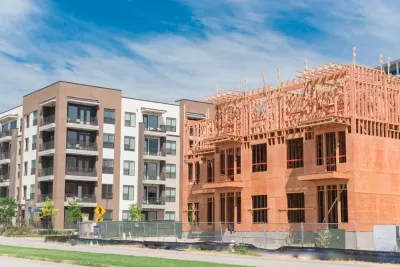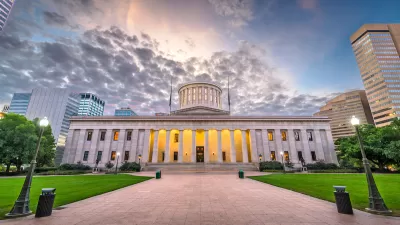A tax break approved by the Texas Legislature is delivering massive benefits to developers in the state, but advocates say the public isn't getting the promised return on investment.

Eric Dexheimer shares news of new analysis from researchers at the University of Texas School of Law about the effect of a 2015 tax break approved, ostensibly, for affordable housing projects in Texas. The tax break was approved in a last minute amendment "onto a densely worded bill updating finance statutes" by Republican State Senator Craig Estes and promised to deliver a financial boost to affordable housing developers.
"Since then, the one-sentence amendment has resulted in private developers receiving tens of millions of dollars in property tax breaks. It has saved them millions more in tax-free construction costs — all with scant benefit to the public," explains Dexheimer of the findings of the study released earlier this week.
In response to the quick popularity of the tax break for projects around the state, estimated by the report to deliver annual property tax breaks to apartment developers of close to $1 million per property on average, advocates are pressing back on the idea that the project is delivering promised low-income housing.
[T]hanks in part to a series of loopholes buried in the paperwork, the so-called affordable housing created in exchange for the 2015 tax breaks often is as expensive as market-rate apartments, said Heather Way, a professor at the Austin law school and lead author of the study. “The public’s just not getting the return on its investment,” she said.
John Henneberger, co-director of the Texas Low-Income Housing Information Service, is quoted in the article raising the stakes on Way's statement. Henneberger says the tax break is a misuse of taxpayer funds.
FULL STORY: How a big Texas tax break created not-so-affordable housing

Alabama: Trump Terminates Settlements for Black Communities Harmed By Raw Sewage
Trump deemed the landmark civil rights agreement “illegal DEI and environmental justice policy.”

Study: Maui’s Plan to Convert Vacation Rentals to Long-Term Housing Could Cause Nearly $1 Billion Economic Loss
The plan would reduce visitor accommodation by 25% resulting in 1,900 jobs lost.

Planetizen Federal Action Tracker
A weekly monitor of how Trump’s orders and actions are impacting planners and planning in America.

Waymo Gets Permission to Map SF’s Market Street
If allowed to operate on the traffic-restricted street, Waymo’s autonomous taxis would have a leg up over ride-hailing competitors — and counter the city’s efforts to grow bike and pedestrian on the thoroughfare.

Parklet Symposium Highlights the Success of Shared Spaces
Parklets got a boost during the Covid-19 pandemic, when the concept was translated to outdoor dining programs that offered restaurants a lifeline during the shutdown.

Federal Homelessness Agency Places Entire Staff on Leave
The U.S. Interagency Council on Homelessness is the only federal agency dedicated to preventing and ending homelessness.
Urban Design for Planners 1: Software Tools
This six-course series explores essential urban design concepts using open source software and equips planners with the tools they need to participate fully in the urban design process.
Planning for Universal Design
Learn the tools for implementing Universal Design in planning regulations.
Caltrans
Smith Gee Studio
Institute for Housing and Urban Development Studies (IHS)
City of Grandview
Harvard GSD Executive Education
Toledo-Lucas County Plan Commissions
Salt Lake City
NYU Wagner Graduate School of Public Service





























